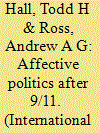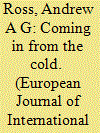| Srl | Item |
| 1 |
ID:
146143


|
|
|
|
|
| Summary/Abstract |
Affect and emotion are key elements of our lived experience as human beings but currently play little role in how we theorize actorhood in international relations. We offer six amendments for integrating affective dynamics into existing conceptions of individual-level actorhood in IR. From these amendments emerge the theoretical micro-foundations upon which we build propositions concerning potential collective-level affective dynamics and political strategies. We illustrate the analytical payoff of our proposals by examining the aftermath of the terrorist attacks on 11 September 2001. By amending existing understandings of actorhood to include human affective experience, we can integrate and make sense of a variety of psychological, social, and political consequences stemming from the attacks, both within the United States and internationally.
|
|
|
|
|
|
|
|
|
|
|
|
|
|
|
|
| 2 |
ID:
071776


|
|
|
|
|
| Publication |
2006.
|
| Summary/Abstract |
A variety of constructivists have begun to address emotions in IR, viewing emotional events and memories as important dimensions to the social construction of identity. But it is not clear that constructivist tools, designed in most cases for interpreting discursive representations, are equipped to study affective phenomena. This article offers a critical assessment of constructivism's ability to theorize affects-nonconscious and embodied emotional states-in global politics. Using as an example the ontology developed by Alexander Wendt, the article suggests that common presuppositions in orthodox constructivism in fact obstruct the study of affect and its role in social and political life. To grasp the depth, intensity, and fugitivity of emotional phenomena, constructivism needs to rethink its attachments to reflective agency, ideational processes, and symbolic meaning. Through a brief discussion of the American response to 9/11, the final section develops several propositions on the role of affect in forging political identities.
|
|
|
|
|
|
|
|
|
|
|
|
|
|
|
|